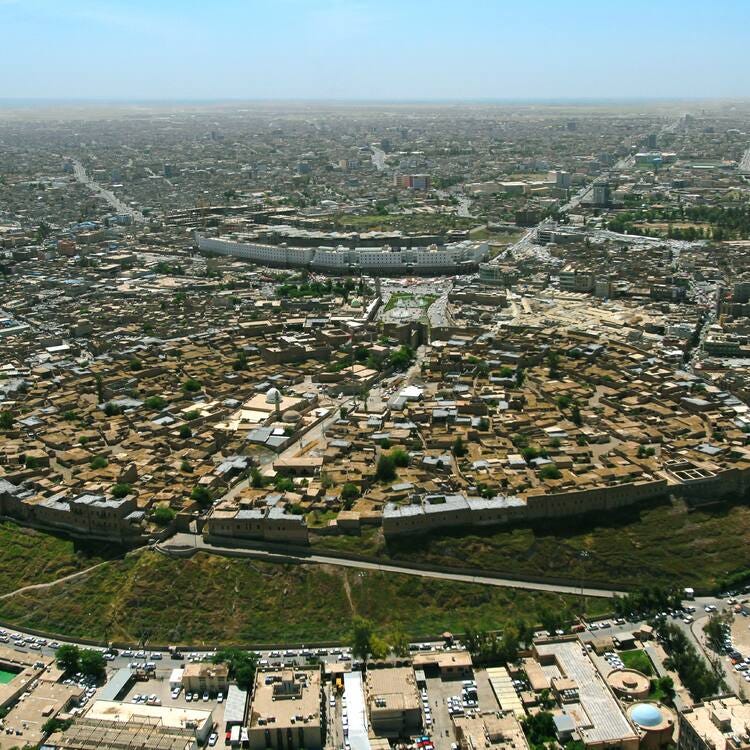Mastering Kurdish
Daya is a quick way to grasp Kurdish for novice language learners looking to engage with Kurds and understand their culture
“There are a lot of opportunities for foreigners in Kurdistan,” says language teacher Nabaz Babajan, pointing to the capital’s status as a hub for foreigners in Iraq. Yet despite a large expat community, there are limited opportunities for foreigners to learn the local tongue. When Babajan started giving private lessons back in 2018, he was surprised by the dearth of materials for Kurdish learners and set out to make it more accessible.
“A lot of people don’t know anything about the Kurdish language. There’s a huge information gap,” says Babajan, who believes a better understanding is key to appreciating Kurdistan and its people. “Our culture is beautiful, but many people know nothing about it. I want them to understand it, especially Kurdish children living abroad.”
He works alongside his wife, who is from the US and teaches English to Kurdish and Arabic speakers. “We’re a team,” he says. Among their clients are Kurdish families living in the US, Europe and the UK, who want their children to understand their heritage. “The Kurdish identity is a powerful bond,” says Babajan. “Even if they live all their lives in Brazil, they will say they are Kurdish first.”
Others are new to Kurdish culture. Several of his students are Western women who have married Kurdish men and want to learn the language so they can speak with their husband’s family, Babajan explains. Many are in Kurdistan for work and want to learn more about the people and culture around them.
The Kurdish capital Erbil is a hub for the international community and a burgeoning center for business in the region. “People want to do well in their work and communicate better with colleagues,” Babajan says. “It’s also safer than Iraq, a better place to live,” he adds.
Other Kurdish cities, including Duhok in the north and Sulimaniye in the south, also attract foreigners, who come from across the region and further afield to work and study. Dialects vary considerably across Kurdistan, with two main languages, including Kurmanji, which is the dominant tongue in Duhok, and Sorani, which is spoken across the south.
Kurmanji is the most widely used Kurdish dialect, with around 15 to 17 million speakers across the wider region, but Babajan teaches Sorani because he says it is easier to understand. “If a Kurmanji speaker comes to Sulimaniye, they can understand us because our dialect is easier, but it doesn’t work the other way around,” he says.
Though closely related in some respect, the two languages have significant variances, with Kurmanji drawn from a Latin-based script while Sorani uses Arabic-based letters. “It’s hard - you can’t just use a dictionary because the structure is different,” he explains.
Sorani is common in areas of Iraq and Iran, where Kurds have greater freedom to speak their native tongue. In other countries, including Turkey and Syria, governments have taken steps to oppress Kurdish as part of the broader discrimination suffered by Kurdish communities. In Turkey, where Kurds are the largest ethnic minority, accounting for around 18 percent of the population, Kurdish was banned until 1992, while in Syria it is rarely spoken in public.
In Iraq, Kurdish communities suffer discrimination, but there is greater acceptance of their unique culture across the autonomous region of Kurdistan. “The media misrepresents Kurds, but through our culture we can convey the beauty and generosity of our people and our land,” says Babajan.
He plans to expand his teaching from private lessons to a public portal that’s available to all viewers. Supported by an Innovation Hub grant from Ideas Beyond Borders, Babajan is launching Daya, which will provide bite-sized Kurdish classes online free of charge.
“I do the private classes to earn an income, but Daya will be free to help others gain the foundations of our language,” Babajan says. The format will be short videos on social media, each tackling a different question for confused language learners, such as the differences between similar letters, the proper pronunciation of tricky sounds and grammar rules that can’t be ignored.
“Language learning should be fun,” says Babajan whose classes target both English and Arabic speakers learning Kurdish. “We want people to be able to communicate when they come. “If you speak the language, you can go anywhere you want without having to stop and rely on a translator - you can truly experience the culture.”






Struggle Greetings!
We're All Volunteer Collective of Polemics: Journal of the Workingclass Struggle, Proud Members of the Philadelphia Chapter, National Writers Union, NWU.ORG broadcasting at phillycam.org/WATCH Mondays 1:30 PM ET USA ROKU APPLE TV FIOS 29/30 XFINITY 66/966HD
CONTACT
A.V.C.P.
KEN HEARD
267 259-7196@mms.att.net
[ Plaintext and attachments only. ]